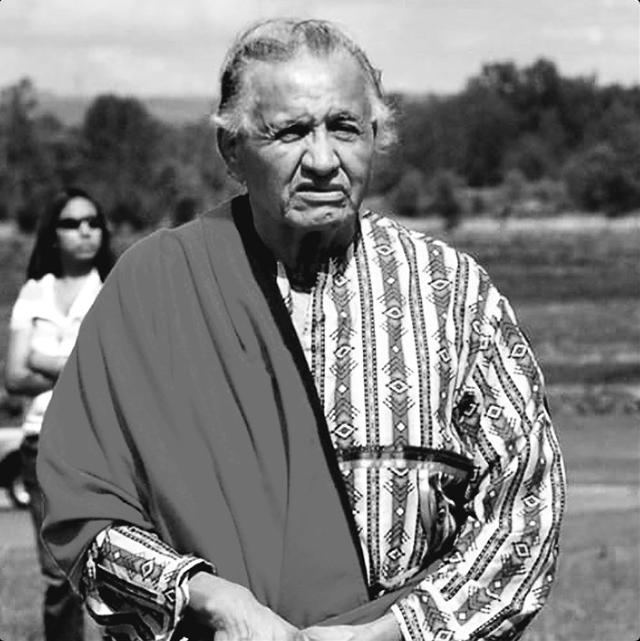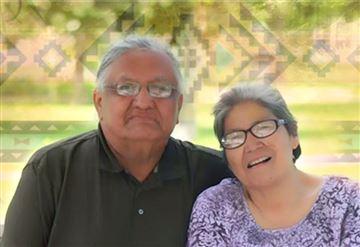 |
Canku Ota
|
 |
|
(Many Paths)
|
||
|
An Online Newsletter
Celebrating Native America
|
||
|
DECemBER 2020 - Volume
18 Number 12
|
||
|
|
||
|
Standing Rock Sioux
Elder Who Helped Preserve Lakota Language Succumbs To Covid
|
||
|
by Erik Ortiz - NBC
News
|
||
|
Jesse "Jay" Taken
Alive, 65, was a former chairman of his tribe, an advocate for his
people and a protector of the language and culture.
In October, as the coronavirus outbreak swept across the Standing Rock Sioux Tribe's reservation, straddling the North and South Dakota border, tribal elder Jesse "Jay" Taken Alive was sidelined with a nagging cough. He tested positive for Covid-19. Within a week, his wife, Cheryl, who was feeling congested and weak, did, too. The couple's health began to deteriorate, their children recalled: Taken Alive was rushed to the Indian Health Service hospital in Fort Yates, North Dakota, and hospitalized for a few days. Later, he and his wife were both admitted to a larger hospital in Fargo, only one floor apart but unable to see each other. Cheryl, a retired human services worker, could no longer walk on her own. She died on Nov. 11, at age 64. Days later, doctors had suggested putting Taken Alive, whose lungs had declined, on a ventilator, according to his family. But Taken Alive resisted, retaining an upbeat spirit for his five adult children, 10 grandchildren and three great-grandchildren. On Monday, four of Taken Alive's children were with him in the hospital. He held their hands and spoke haltingly in his native Lakota language. "It's time," he told them. He was 65. One of his sons, Ira Taken Alive, who had cared for his parents and was himself hospitalized with Covid-19 but recovered, said his father in recent days had come to grips with his failing health. But the loss of his wife — they would have been married 46 years next month — was especially cruel. "In the end, if we could have listed the cause of death, we would have said he died of a broken heart," Ira Taken Alive said.
Ira Taken Alive followed in his father's footsteps in becoming an elected tribal leader, the vice chairman of the Standing Rock Sioux Tribe. The elder Taken Alive was chairman of the Standing Rock Sioux from 1993 to 1997 and a longtime council member before retiring in 2015. Ira Taken Alive said his father was a fierce advocate for his people, recalling how he publicly called for the University of North Dakota to retire its Fighting Sioux nickname and logo in the 1990s, saying it did not honor their history and was the source of racist incidents for many years. The issue remained divisive, but the school eventually changed its mascot to the Fighting Hawks in 2015. "When push came to shove, Standing Rock held its ground," Ira Taken Alive said. The list of issues his father was passionate about seemed never-ending: ensuring tribal sovereignty; speaking out against the taking of Indigenous lands by outside governments; solving the high drug abuse and suicide rates devastating tribal communities; providing access to higher education for young people; and supporting protests against the construction of the Dakota Access oil pipeline running within a half-mile of the Standing Rock Sioux Reservation. On Thanksgiving Day in 2016, Taken Alive addressed hundreds of protesters at the Standing Rock High School in Fort Yates, and in an emotional speech that made some in the audience cry, he compared Native Americans joining forces at Standing Rock to the aiding of Sitting Bull at the Battle of the Little Bighorn in 1876. "We must defend the women and children — and the water," he told the crowd. Last year, Taken Alive was among the elders who welcomed the Swedish climate activist Greta Thunberg to the reservation during her tour of the United States. Taken Alive gave Thunberg a Lakota name: Maphiyata echiyatan hin win, translated to "woman who came from the heavens." "Only somebody like that can wake up the world," he reportedly told Thunberg. "We stand with you. We appreciate you. We love you as a relative." Maintaining the Lakota language and culture and sharing it with younger generations remained one of Taken Alive's biggest endeavors, said one of his daughters, Jessie Taken Alive-Rencountre. Taken Alive worked with the nonprofit Lakota Language Consortium, which seeks to preserve the language, and taught it to schoolchildren in the McLaughlin School District in the Standing Rock Sioux Reservation. The children lovingly referred to Taken Alive as "LaLa Jay," meaning grandfather. Taken Alive's family isn't certain how he and his wife contracted the coronavirus, but said the couple had been mindful of wearing masks and social distancing — even as many communities in the Dakotas outside of the reservation resisted mask mandates and saw a surge in cases this fall. The family is planning a virtual memorial service for the couple and a private burial next week. "This virus has taken so many of our elders, so many of our treasures," Taken Alive-Rencountre said. "We think, how are we going to survive without my father's guidance and his teachings? But I realize after seeing all these posts and stories on social media from those who knew him, we're the ones who are going to have to keep what he taught us alive for future generations." The loss of both her father and her mother, she said, "leaves a sense of emptiness, but also a sense of purpose."
Erik Ortiz |
|||||
|
|
|
|
||
|
|
||
| Canku Ota is a free Newsletter celebrating Native America, its traditions and accomplishments . We do not provide subscriber or visitor names to anyone. Some articles presented in Canku Ota may contain copyright material. We have received appropriate permissions for republishing any articles. Material appearing here is distributed without profit or monetary gain to those who have expressed an interest. This is in accordance with Title 17 U.S.C. Section 107. | ||
|
Canku Ota is a copyright ©
2000 - 2020 of Vicki Williams Barry and Paul Barry.
|
||
 |
 |
|
|
The "Canku
Ota - A Newsletter Celebrating Native America" web site and
its design is the
|
||
|
Copyright ©
1999 - 2020 of Paul C. Barry.
|
||
|
All Rights Reserved.
|
||

